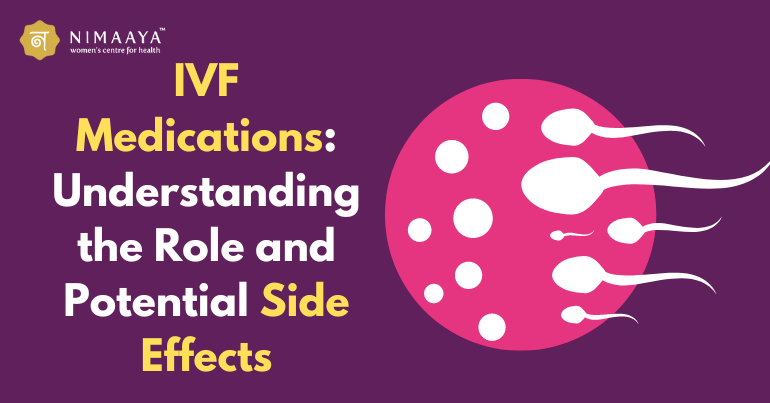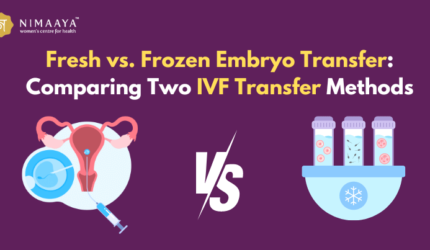Fertility medications play a significant role in assisting couples in becoming parents and are often a necessary part of fertility therapies. These drugs work to control ovulation, promote the generation of eggs and sperm, and improve the odds of pregnancy. They are available in many forms, including pills and injections, and are utilized at various points during the IVF process. For individuals navigating the complicated world of fertility treatments, knowing how these drugs function and their possible advantages can be quite helpful. We shall explore the varieties, applications, and advantages of fertility drugs in this guide.
A Guide to IVF Medications

Even among individuals who are on the same reproductive journey, an IVF medication regimen may differ from person to person. Some drugs can be taken orally, while others are injectable (given as injections). Your particular circumstances and the plan your provider decides is appropriate for you and your objectives will dictate the IVF drugs you may use and the amounts that are given.
Whatever your particular protocol, you should be aware of the vital function that drugs play in the IVF procedure. Some of the most common types of IVF medications include:
• Medications to stimulate the ovaries to cause more than one egg to develop at a time:
Follicle-stimulating hormone (FSH), luteinizing hormone (LH), or a mix of the two may be found in this drug. These medications promote the production of several eggs at the same time.
• Medications to help the eggs mature:
When the ovaries’ fluid-filled sacs containing eggs, known as follicles, are prepared for egg extraction, an agonist (such as Lupron) or human chorionic gonadotropin (hCG)-containing drug will aid in the development of the eggs. While every individual is unique, the typical time for eggs to mature during an IVF cycle is between 8 and 14 days.
• Medications that stop ovulation from beginning too soon:
These drugs aid in preventing the release of eggs before they are developed to the point of maturity and readiness for retrieval.
• Medications to prepare the uterine lining:
On the day of egg retrieval or embryo transfer, you may also take progesterone-containing medications to help make your uterine lining for implantation.
Types of Fertility Medications

Fertility drugs come in a variety of forms, each intended to treat a particular type of fertility problem. The type of medication prescribed often depends on the unique needs and circumstances of the individual or couple.
‣ Fertility Drugs for Ovulation Stimulation
The purpose of ovulation stimulation medications is to stimulate the release of eggs from the ovaries. These drugs, which include letrozole and clomiphene, are frequently the first choice for women with irregular or nonexistent menstrual cycles. They work by triggering the body to produce more of the hormones that stimulate egg development.
‣ Fertility Drugs for Ovarian Stimulation
When ovulation stimulation medications are ineffective or when numerous eggs are required for therapies like in vitro fertilization (IVF), ovarian stimulation drugs, such as gonadotropins, are utilized. These medications boost the chances of successful fertilization and implantation by stimulating the ovaries to generate numerous eggs.
‣ Fertility Drugs for Triggering Ovulation
Drugs for triggering ovulation, such as hCG (Human Chorionic Gonadotropin), are used to trigger the final maturation of the eggs and initiate their release from the ovaries. This is crucial for the timing of insemination or egg retrieval in fertility treatments.
The Role of Fertility Medications in Pregnancy

Fertility medications play a pivotal role in facilitating pregnancy. They are primarily used to address issues related to infertility by stimulating the production of eggs in women and enhancing sperm quality in men. In certain cases, fertility medications are used in conjunction with assisted reproductive technologies like In Vitro Fertilization (IVF) to increase the chances of successful implantation and pregnancy. Understanding their role can help couples make informed decisions about their fertility journey.
Infertility Treatments: The Importance of Fertility Medications
One of the most important parts of reproductive treatments is fertility medicine. They perform several tasks, such as inducing the release of eggs or sperm and readying the uterus for implantation.
Fertility drugs are used in procedures like intrauterine insemination (IUI) and in vitro fertilization (IVF) to encourage the ovaries to generate a large number of eggs. This increases the chances of successful fertilization and subsequent implantation.
Fertility medications also play a vital role in regulating the menstrual cycle, ensuring that the timing of egg retrieval and embryo transfer in treatments like IVF aligns with the woman’s natural cycle.
It is essential to remember that fertility drugs play a critical role in reproductive therapy. They have a major role in raising the likelihood of a fruitful conception and pregnancy.
Benefits of Fertility Medications

Fertility medications offer several benefits that can significantly aid individuals and couples on their fertility journey. Here are the main benefits:
① Improving Chances of Pregnancy
One of the primary benefits of fertility medications is their ability to improve the chances of pregnancy. These drugs raise the chances of successful fertilization and implantation by inducing the development of numerous eggs, which increases the possibility of pregnancy overall.
② Regulating Ovulation
Ovulation regulation is another important function of fertility drugs. For women with irregular or absent menstrual cycles, fertility drugs can help regulate their cycles and ensure the timely release of a mature egg. The likelihood of a natural conception might be considerably increased by this regulation.
③ Assisting in Egg and Sperm Production
Both egg and sperm production can be aided by several fertility drugs. Medication can encourage women’s ovaries to generate more eggs. For men, certain medications can improve sperm count and quality, enhancing their fertility.
In conclusion, the benefits of fertility medications are manifold and can significantly improve the chances of conception, making them a vital tool in fertility treatments.
Potential Side Effects and Risks of Fertility Medications

Though there are significant benefits, there are several IVF medications side effects. Individuals and couples need to be aware of these when considering fertility treatments.
❧ Hormonal Changes:
Due to changes in hormone levels, fertility medicines might result in headaches, hot flashes, and mood swings.
❧ Multiple Pregnancies:
Multiple pregnancies are more likely to occur as a result of these drugs, which raises hazards for the mother and the unborn child.
❧ Ovarian Hyperstimulation Syndrome (OHSS):
Fertility medicines can, in rare instances, result in OHSS, a painful and swollen condition of the ovaries.
Despite these potential risks, fertility medications remain a crucial tool in fertility treatments, and any concerns should be discussed with a healthcare provider.
Know IVF Cost in Detail
IVF therapy in India can cost anywhere from ₹1,00,000 to ₹3,50,000, depending on the number of cycles, extra procedures, clinic repute, and other considerations. IVF treatment may not be covered by health insurance, although some clinics may provide free EMI options to help with the expense.
How Much Do IVF Medications Cost in India?
IVF medications cost in India can vary depending on several factors, including the clinic’s reputation, the location, the type of IVF operation necessary, the medications required, the success rate, the experience of the specialist, and the components of the overall IVF package. On average, a single IVF cycle’s cost in India can range from ₹1,00,000 to ₹3,00,000 or even more, depending on the above-mentioned factors.
Conclusion
Understanding IVF’s side effects is crucial for anyone undergoing IVF treatment. It’s critical to discuss any concerns you may have openly with healthcare professionals. Nimaaya IVF center offers safe IVF treatments with experienced Fertility specialists and the latest technology. The effectiveness of IVF treatment is evidence of medical progress, despite possible negative effects. Do not forget that you are getting closer to your dream with each action you take.











